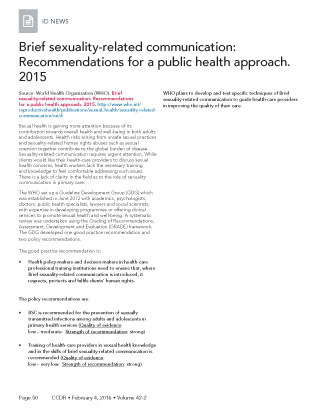Archived - ID News: February 2016

 Download this article as a PDF (59 KB - 1 page)
Download this article as a PDF (59 KB - 1 page) Published by: The Public Health Agency of Canada
Issue: Volume 42-2: Update on STIs
Date published: February 4, 2016
ISSN: 1481-8531
Submit a manuscript
About CCDR
Browse
Volume 42-2, February 4, 2016: Update on STIs
ID News
Brief sexuality-related communication: Recommendations for a public health approach. 2015
Source: World Health Organization (WHO). Brief sexuality-related communication: Recommendations for a public health approach. 2015.
Sexual health is gaining more attention because of its contribution towards overall health and well-being in both adults and adolescents. Health risks arising from unsafe sexual practices and sexuality-related human rights abuses such as sexual coercion together contribute to the global burden of disease. Sexuality-related communication requires urgent attention. While clients would like their health-care providers to discuss sexual health concerns, health workers lack the necessary training and knowledge to feel comfortable addressing such issues. There is a lack of clarity in the field as to the role of sexuality communication in primary care.
The WHO set up a Guideline Development Group (GDG) which was established in June 2012 with academics, psychologists, doctors, public health specialists, lawyers and social scientists, with expertise in developing programmes or offering clinical services to promote sexual health and well-being. A systematic review was undertaken using the Grading of Recommendations, Assessment, Development and Evaluation (GRADE) framework. The GDG developed one good practice recommendation and two policy recommendations.
The good practice recommendation is:
- Health policy-makers and decision-makers in health-care professional training institutions need to ensure that, where Brief sexuality-related communication is introduced, it respects, protects and fulfils clients' human rights.
The policy recommendations are:
- BSC is recommended for the prevention of sexually transmitted infections among adults and adolescents in primary health services (Quality of evidence: low - moderate. Strength of recommendation: strong)
- Training of health-care providers in sexual health knowledge and in the skills of brief sexuality-related communication is recommended (Quality of evidence: low - very low. Strength of recommendation: strong)
WHO plans to develop and test specific techniques of Brief sexuality-related communication to guide health-care providers in improving the quality of their care.